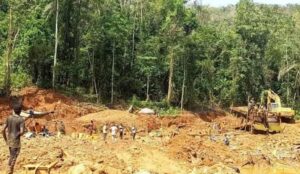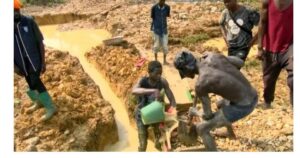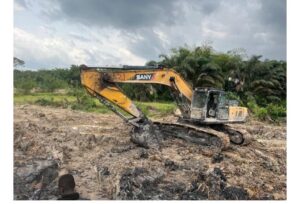Ghana’s Forest Reserves in Crisis: 44% Destroyed Due To Galamsey
 Ghana is facing a severe environmental crisis as nearly half of its forest reserves have been destroyed according to Lands and Natural Resources Minister Emmanuel Armah-Kofi Buah. Speaking to mrwoode.com the Minister revealed that 44% of Ghana’s 288 forest reserves have been lost due to illegal mining (galamsey) and logging activities.
Ghana is facing a severe environmental crisis as nearly half of its forest reserves have been destroyed according to Lands and Natural Resources Minister Emmanuel Armah-Kofi Buah. Speaking to mrwoode.com the Minister revealed that 44% of Ghana’s 288 forest reserves have been lost due to illegal mining (galamsey) and logging activities.
I stood in Parliament and said We are in a crisis. It’s not a political point it’s a national alarm, Mr. Buah declared. He further revealed that nine of the reserves have been classified as red zones due to the extreme level of degradation.
The destruction of these forests goes beyond the loss of trees. This is not just about trees. It’s about the air we breathe the water we drink and the future of this country, he emphasized.
 The primary causes of this alarming deforestation include:
The primary causes of this alarming deforestation include:
• Illegal mining (galamsey): Unregulated gold mining has led to the destruction of vast forest areas and the pollution of water bodies.
• Illegal logging: Unchecked cutting of trees often for export has contributed significantly to forest loss.
• Encroachment for agriculture and settlements: The expansion of farmlands and unauthorized settlements has led to further depletion of forest reserves.
Mr. Buah has called on all Ghanaians especially the youth to get involved in reforestation efforts to help restore the country’s lost forests. He also urged for stricter enforcement of environmental laws including tougher penalties for illegal miners and loggers particularly foreign nationals involved in these destructive activities.
 The government has pledged to take urgent steps to address this crisis but public participation will be key in reversing the damage. The Minister’s revelations have sparked widespread concern among environmentalists policymakers and citizens with many calling for immediate action to protect Ghana’s remaining forests.
The government has pledged to take urgent steps to address this crisis but public participation will be key in reversing the damage. The Minister’s revelations have sparked widespread concern among environmentalists policymakers and citizens with many calling for immediate action to protect Ghana’s remaining forests.
With 44% of Ghana’s forest reserves already gone the country stands at a critical crossroads. If immediate action is not taken the consequences for future generations could be severe. It is now up to both the government and the people of Ghana to work together in protecting and restoring the nation’s forests before it is too late.


